She would put on a burkha every morning so that choto chacha, my dad?s younger brother, could drop her off at her parents. He would take her to her college instead. That was how Quazi Anwara Monsur graduated. Dadi didn?t want her daughter-in-law to be getting an education, but Amma had the full support of Abba, my father. Her in-laws probably knew what was going on, but as long as Dadi?s authority was not directly challenged, Amma was quietly allowed to complete her studies.
Amma had made a mark upon her arrival from Kolkata to her in-laws in Faridpur. Word had gotten round that Monsur?s wife knew how to shoot a gun. She had many other skills too, and being a school teacher was also able to support the family. When Phupuabba (my father?s brother-in-law) died, the orphans were split up. Bhaijan and Rubi Bu came to live with us. Only my sister had been born then, and overnight a one child family became a three child family. They were difficult times. The family had come over to flee the riots in Kolkata and my father?s low paid government salary was simply not enough. Particularly as Abba and Amma insisted that all the children should have a good education. Amma?s teaching job, plus the extra income she made from marking exam papers wasn?t enough to keep the family going. She would buy wool from the market and knit sweaters to sell for extra income. Later Khaled Bhai was born and no other children were planned. In Amma?s words, I was an ?accident.? Dadi, who had always been against her daughters-in-law going to work, saw the value of what Amma was doing and later it was Amma she used as an example to encourage her other daughters-in-law to get jobs.
Mera Sunder Sapna, the song Amma loved to sing
Once they moved to Dhaka, Amma wanted to setup a school in Azimpur colony. No one was supportive, but that never stopped her. Buying a tent from Rafique Bhai for ten taka, she pitched it in the middle of Azimpur playground and set up Azimpur Kindergarten. Later, in its new name of Agrani Balika Biddalaya, the school and the college went on to become one of the finest educational institutions for girls in the country.
New classrooms grew alongside the tent. There was a large classroom ?The Pavilion? which even had brick walls. When a storm in sixties blew away the bamboo classrooms, Amma sat crying in the mud floor that remained. A guardian saw her from the veranda of their house and came over to comfort her. ?Do you think it is only your school? he had said. ?It belongs to all of us, and we?ll rebuild it.? They did. The guardians and the teachers and the children had organized cultural shows and other fund raisers. This time they were determined there were to be no more bamboo walls. Each classroom had a tin roof but the walls were made of bricks.
Many years later, Amma felt she needed qualifications in psychology to run her school better. She managed to get herself a scholarship to go to Indiana University, and eventually got herself a PhD in child psychology. That was the nature of the woman. Less than five feet tall, once this diminutive woman had decided on something, there was little that could stop her. This did not always make it easy on her children. Her standards were high, and those who failed to meet them, or like my brother Khaled, who felt there were other things to life, felt the brunt of her wrath. The dedicated teacher was not always the compassionate mother. Her public contributions won her the Rokeya Padak, a state award, but with the death of her son Amma paid a terrible price. The night before he took his life Khaled Bhai told me, ?I am making things easier for you.? I had not understood the implications then. I was 14, he had just turned 21. It was a price we all paid.
His death had mellowed Amma, and I got away with much that my brother would have been chastised for. Having lost one son, she became hugely protective of the other. After the 1971 war, Amma and I went over to Kolkata to smuggle my sister and her family out of the country. It was my first taste of India and Amma and I used the opportunity well. Kolkata was the cultural capital of India and we would see three films a day, and the occasional play.On our return to a free but unsettled Bangladesh, we found things were dangerous, and there were no set rules. Once, when I needed to negotiate with some hijackers who had stolen our car, this tiny woman insisted she would stay with me and be my bodyguard.
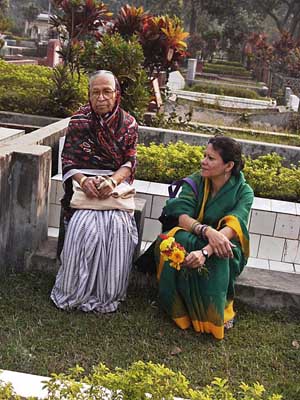 Amma and Rahnuma by Khaled Bhai’s grave
Amma and Rahnuma by Khaled Bhai’s grave
Her protectiveness had its own problems, and as an adult, when I rejected her choice of a homely bride and found a partner of my own, she did all in her power to break up our love. Rahnuma and I stuck together despite it. Though Amma later relented, our relationship had been severely tested, and came precariously close to breaking point. Amma was strong and feisty, and didn?t take being challenged too lightly. Plucky, headstrong, and hugely energetic, she nurtured whatever she loved with a passion. Till she was 80, she would go to college everyday, ensuring that it ran smoothly.
I had gone to UCLA for the Regents Lecture. It was in LA that I got Rahnuma?s message that Amma had been taken to hospital. Apamoni, the ever dutiful daughter, now a retired doctor in London, had rushed to Dhaka to nurse her. She told me that things were stable, and I needn?t hurry back. I went on to Florence where I was conducting a seminar. Rahnuma?s second message said Amma was slipping. It was a very long flight back. My nieces Mowli and Sofia got a last minute Emirates flight and we met up in Dubai. An hour?s delay at the airport, the delay at the luggage belt on reaching home and the rush hour traffic became unbearable as we wondered whether we would see her alive. Amma wasn?t going to give up that easily. She wanted us around, and her face glowed as she saw the three of us. Fariha, my youngest niece, arrived the next day.
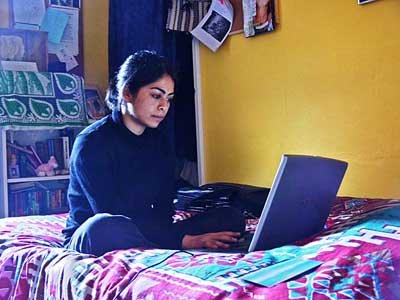 Fariha
Fariha
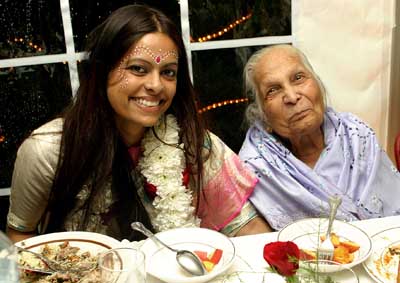 Amma at Sofia’s wedding
Amma at Sofia’s wedding
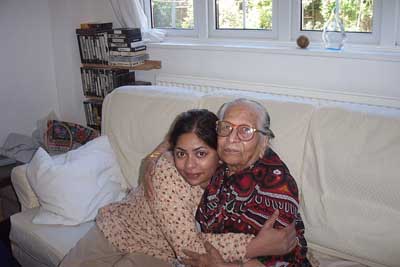 Amma and Mowli
Amma and Mowli
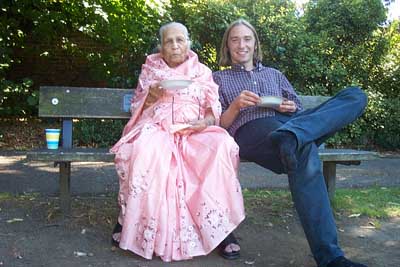 Amma and Sofia’s husband David
Amma and Sofia’s husband David
My nieces got out the family album, and through the pain, she peered through the photographs. As she looked at a picture of me, Fariha asked ?Who are you looking at?? The face broke into a smile. Frail, but distinctly a smile. It is wonderful how the tiniest of movements transforms a face. She whispered my nickname ?Zahed?. Later as she strained to lift her hand to stroke me, Fariha joked, ?Grandma, pull his beard.? Another smile and a whisper, ?Beard?? Later when she stroked me again, Fariha repeated her joke. Another impish smile and the word ?Pull?? Those were the last three words she ever spoke.
Apamoni had toiled ceaselessly to take care of her. Rahnuma had run ragged with errands, her grandaughters stayed up all night giving her water, changing her clothes, checking the oxygen pressure, coaxing her to eat and put on the nebuliser. Hameeda and Zohra both knew Amma well. They bathed her, combed her hair and nursed her, trying to interpret every gesture. Delower, whom Amma saw as a son, was omnipresent and kept the ship from sinking. Dulabhai, my brother-in-law, also a retired doctor, kept vigil from afar. But it was me that she longed for. This was not the time to dwell on patriarchal politics. I was losing a person who loved me beyond reason. With all my traveling, I had always wondered where I might be, when the time came. I needn?t have worried. Amma waited till I returned.
After many rainy days, with Chittagong in a deluge, the sun shone through this morning. Amma didn?t like 13. Saturdays were bad. Thursday was the best day of the week. At 8 this morning, Thursday, the 14th June, carefully sidestepping a 13 and a Saturday, with the sun glistening on her favourite champa tree, Amma chose to say goodbye.
She was 83. In those last few days, I saw my mother in a way I hadn?t before. I knew the softness of her skin, every little mark on her face, the shape of her tiny feet, the wrinkles on her fingers. As I carried her to the wheelchair, or moved her up the bed, I felt her weight against my body. I knew how it felt to be lovingly stroked by a hand that had barely the strength to move.
Her janaja was at the Takwa Masjid in Dhanmondi. My colleagues at Drik and Pathshala, our Out of Focus children did all that was needed. They would have borne my grief if they could. Many years ago, I had stood in the same mosque during Abba?s janaja, on an Eid day. We then went to her school. As the long line of students, teachers and well wishers from all over Azimpur walked past to take one last look at their beloved Boro Apa (big sister), I walked across to the classroom where I had studied. Through my tears, the benches and tables looked tiny now. Sitting on the bench and looking up at the blackboard I could hear Boro Apa?s footsteps on the corridor.
The grave in the New Azimpur Graveyard, had been bought in 1970, when Khaled Bhai had died. We had then bought three plots, for Amma, Abba and Khaled Bhai. The plot in the centre had been empty. I lowered Amma into the grave. She herself had bought the shroud and had it washed with Aab e Zam Zam, the holy water from Mecca, in preparation for this moment. The white shroud glistened against the dark clay. Our relatives and friends, Ammas students spanning sixty odd years, my own students and Amma?s numerous admirers were there. They carried the wooden Khatia, lit the incense, scattered rose water. They shared our loss.
I remembered the finality of the knot at the ends that I myself had tied. Neat rows of bamboo stakes were placed diagonally across the grave, shielding her body from the earth that was going to cover her. Bamboo mats were folded over the stakes that sealed her in. Then we all took turns to cover her with earth. After the munajat (prayers), as I walked away, I imagined my mother in between her husband and her elder son, reunited in death. I could hear them calling out to me ever so lovingly. ?Zahed?.
Dhanmondi, Dhaka
14th June 2007.

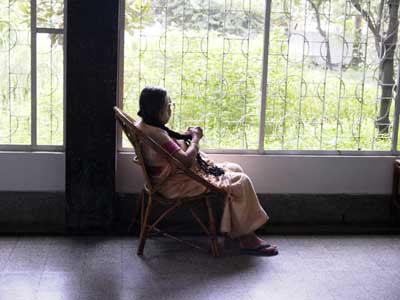
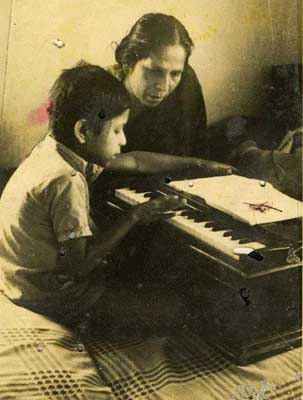
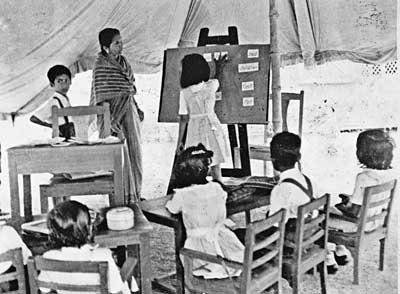
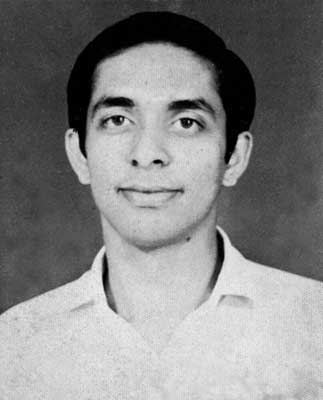
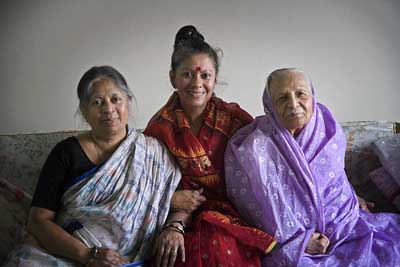
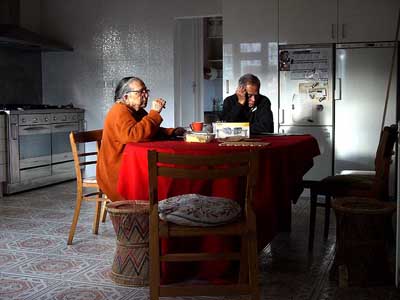 Amma and Dulabhai
Amma and Dulabhai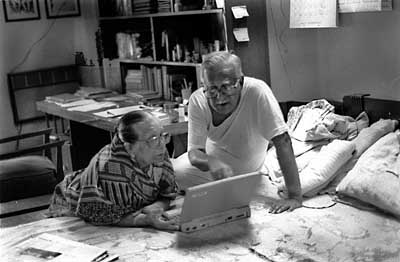



Leave a Reply
You must be logged in to post a comment.